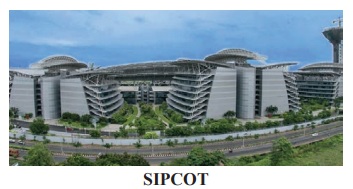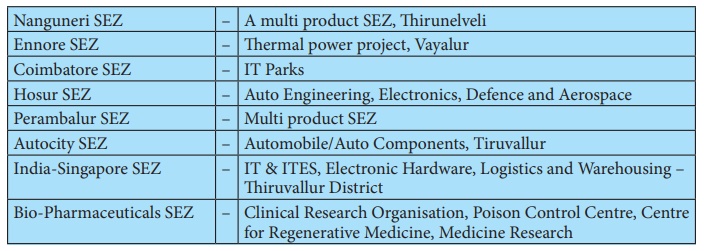Chapter: 10th Social Science : Economics : Chapter 5 : Industrial Clusters in Tamil Nadu
The Policy Factors that Helped the Industrialisation Process in Tamil Nadu
The Policy Factors that Helped the Industrialisation Process in Tamil
Nadu
Policy
factors can be divided into three aspects
Education
Industries
require skilled human resources. Apart from a lot of attention to primary education
to promote literacy and basic arithmetic skills, the state is known for its
vast supply of technical human resources. It is hometo one of the largest number
of engineering colleges, polytechnics and Industrial TrainingCentres in the
country.
Infrastructure
The
widespread diffusion of electrificationhas contributed to the spread of
industrialization to smaller towns and villages in the state. Alongwith electrification,
Tamil Nadu is known for its excellent transport infrastructure, especiallyminor
roads that connect rural parts of the state to nearby towns and cities. A
combination of public and private transport has also facilitated rural to urban
connectivity and therefore connect small producers to markets better.
Industrial Promotion
Apart
from investments in education and transport and energy infrastructure, active policy
efforts were made to promote specific sectors and also industrialisation in specific
regions. Policies to promote specific sectors likeautomobile, auto components,
bio technology and Information and communication
Technology
sectors have been formulated inthe post reform period. In addition, the state has
put in place several industrial promotionagencies for both large enterprises
and the small and medium segments, as well as to providesupporting
infrastructure.
The following are some agenciesthat have played a key role in industrialization in the state
SIPCOT (StateIndustries Promotion
Corporation of Tamil Nadu) - was formed in the year 1971 to
promote industrial growth inthe state by setting up industrial estates.

TANSIDCO (Tamil Nadu Small
Industries Development Corporation) - is a state-agen-cy of the state
of Tamil Nadu established in the year 1970 to promote small-scale industries in
the state. It gives subsidies and provide techni-cal assistance for new firms
in the small scale sector.
TIDCO (Tamil Nadu Industrial
Development Corporation), 1965 - is another government agency to promote industries in the state and to
establish industrial estates.
TIIC (Tamil Nadu Industrial
Investment Corporation Ltd.), 1949- is intended to provide low-cost financial support for both
setting up new units and also for expansion of existing units.
TANSI (Tamil Nadu Small
Industries Corporation Ltd.), 1965 - It is supposed to be the first industrial corporation
operating in the domain for small enterprises.
Issues with Industrialisation
Though
Tamil Nadu has emerged as a relatively highly industrialised state in the
country, the state faces a few issues in sustaining the process. To begin with,
some clusters, especially chemicals, textiles and leather clusters, tend to
generate a lot of polluting effluents that affect health. The effluents also
pollute water bodies into which effluents are let into and also adjoining
agricultural lands. Second, employment generation potential has declined
because of use of frontier technologies because of the need to compete
globally. Quality of employment also has suffered in recent years as most
workers are employed only temporarily.
Special Economic Zones (SEZs)
A policy was introduced in April 2000 for the settling up of
special Economic Zones in the country with a view to a hassle-free environment
for exports.
Accordingly, the
government has converted Export Processing Zones located at following places.

Madras Export Processing Zone (MEPZ)
MEPZ is a Special Economic Zone in Chennai. It is one of the seven export processing zones in the country set up the central government. It was established in 1984 to promote foreign direct investment, enhance foreign exchange earnings and create greater employment opportunities in the region. The MEPZ headquarters is located on GST Road in Tambaram, Chennai.
Startup India
Scheme (Launched 16-Jan-2016):
Startup India Scheme is an initiative of the Indian government,
the primary objective of which is the promotion of startups, generation of
employment and wealth creation.
Standup India
Scheme (Launched 5-April-2016):
Standup India Scheme is to facilitate bank loans between ₹10 lakh and ₹1 crore to at least
one Scheduled Caste (SC) or Scheduled Tribe (ST) borrower and one woman
borrower per bank branch for setting up a greenfield enterprise.
Related Topics